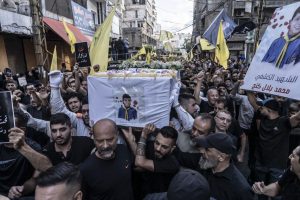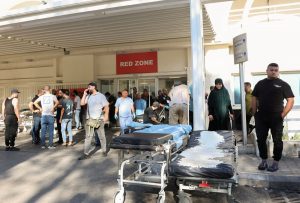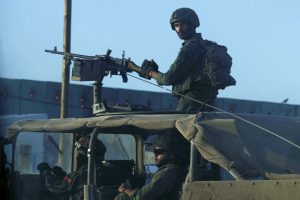BEIRUT—Israel launched another major attack on Hezbollah Friday, with a strike in the Lebanese capital that targeted a senior member of the militant group.
The strike targeted Ibrahim Aqil, believed to be a top Hezbollah military commander, an official familiar with the matter said. The outcome of the strike wasn’t immediately clear.
If successful, the attack would be a significant blow and represent another huge security failure for a group already struggling to recover from a week of airstrikes across southern Lebanon and covert attacks that caused electronic devices carried by thousands of the militant group’s members to explode virtually simultaneously.
Friday’s strike sent a plume of gray smoke up from a residential area in the southern suburbs where Hezbollah maintains a heavy presence. Initial images from the scene showed damage to several buildings and rubble in the street, including burnt-out cars and motorbikes. Lebanon’s Health Ministry reported at least eight dead and 59 wounded.
Israel has conducted several high-profile intelligence operations in and around Beirut since Hezbollah began firing rockets into Israel after the Hamas-led Oct. 7 attacks that set off the war in Gaza. In late July, Israel killed top Hezbollah commander Fuad Shukr in an airstrike in the city. Earlier in the year, Saleh al-Arouri, a founding member of Hamas , was also killed there in a suspected Israeli strike.
The Lebanese militant group, reeling from the intelligence operation that targeted its communication devices, has been trying to determine whether any of its networks are safe as it searches for security gaps and hunts down possible moles in the organization, people familiar with the matter said.
Now it must also contend with the likelihood of further blows as Israel steps up its efforts to end Hezbollah rocket and drone attacks that have forced the evacuation of more than 50,000 people from northern Israel—including the possibility of a wider war.
Israeli Minister of Defense Yoav Gallant warned late Thursday that “the sequence of military actions will continue” as Israel shifts its focus to the north and brings in new troops. Top U.S. military officials are increasingly worried that Israel could launch a ground offensive in Lebanon .
U.S. Defense Secretary Lloyd Austin canceled plans to travel beginning this weekend to Israel, Qatar and Saudi Arabia. Many of Washington’s closest Arab allies and partners in the Middle East fear a possible Israeli invasion of Lebanon, according to Arab officials, who said it could trigger unrest across the region and an opportunity for extremist groups to harness that anger and regroup.
On Friday, many of Hezbollah’s officials and members couldn’t immediately be reached on their mobile phones. One official said the group was struggling to regroup amid worries about the extent to which its communications infrastructure was compromised by the Israelis.
“There is no doubt that we have been subjected to a major security and humanitarian blow that is unprecedented in the history of the resistance in Lebanon at least and unprecedented in the history of Lebanon,” Hezbollah leader Hassan Nasrallah said in a speech Thursday addressing the attacks on the group’s pagers and walkie-talkies that left at least 37 dead and nearly 3,000 injured.
The initial attack, which caused Hezbollah pagers to explode on Tuesday, set off a scramble inside the group to re-establish lines of communications and figure out how the attack took place. The arrival of a second wave of explosions targeting walkie-talkies just days later heightened concerns about whether any of the group’s systems could be trusted, people familiar with the matter said.
Israel followed up with airstrikes on what it said were 100 Hezbollah rocket launch sites and other positions in Lebanon. The airstrikes took place as Nasrallah was preparing to deliver his speech Thursday, and then later that night. Israeli jets also flew over Beirut, setting off sonic booms as the jets broke the sound barrier, to punctuate the message.
Thursday’s airstrikes were more extensive than in previous days and came as the Israeli chief of staff, Herzi Halevi, approved battle plans for the country’s northern front against Hezbollah. Israel recently added the return of evacuated residents to their homes in the north to its official war goals.
The attack on pagers and walkie-talkies was an embarrassing blow to Hezbollah and an illustration of Israel’s far superior capabilities in intelligence and surveillance. The irony is the vulnerability exploited by the attacks was the group’s decision to switch to the comparatively low-tech devices in an effort to avoid the surveillance risks of smartphones.
Senior officials from the militant group have ordered an investigation into the attack. The early results point to a supply-chain intrusion in which Israel inserted explosives into devices that Hezbollah distributed to its members.
People briefed on the operation said Israel laced the batteries of the devices with explosives. Israel then hacked into the hub of the group’s pager network to simultaneously send a message to thousands of users that triggered the blasts, a senior Lebanese security official said.
One challenge is to restore communications after the extensive damage to devices and apparent penetration of the group’s networks. Among the targeted operatives was the head of Hezbollah’s signals unit, which runs the group’s communications systems, a person familiar with the matter said.
Hezbollah is looking into the possibility that collaborators inside the group may have leaked information about the procurement of pagers used by the group and whether files from the organization were handed over to Israel, officials with the group said.
“What Israel has done is it has delivered a very powerful psychological and tactical blow to Hezbollah, and it’s devastating,” said Fawaz Gerges, a Middle East expert and professor of international relations at the London School of Economics. “How do the rank and file feel now? They feel rattled, they feel shocked. They’re off balance.”
Penetration of the group’s communications networks has been an internal concern since early in the war. Nasrallah in February urged his rank and file to throw away their smartphones , saying Israel could use them for surveillance or targeting.
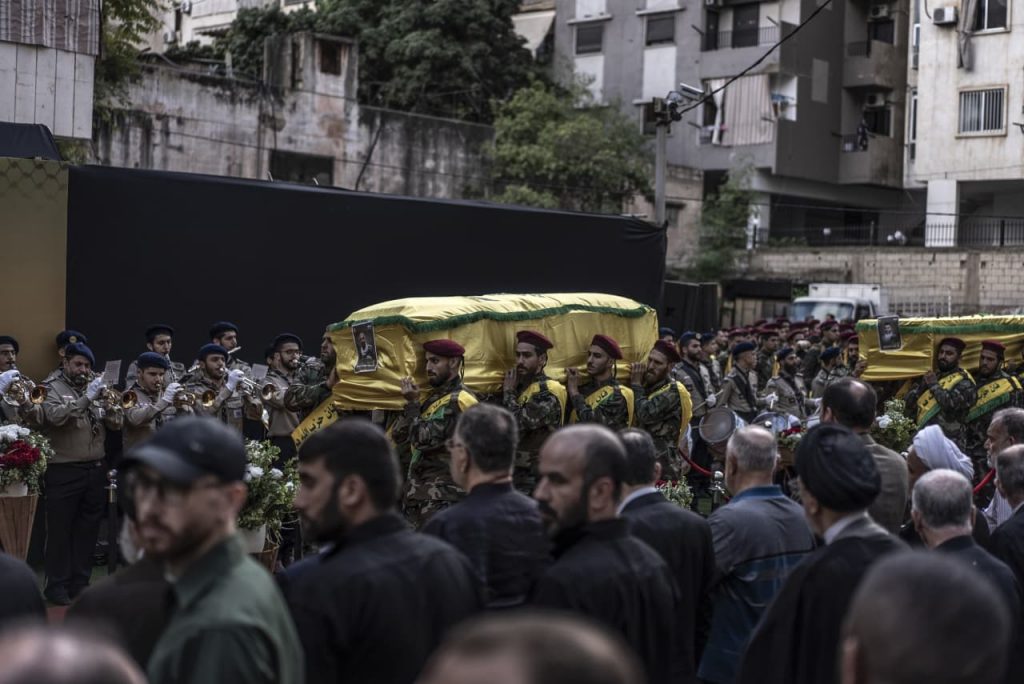
Hezbollah fighters carry the coffin of a group member who was killed in a pager explosion. Photo: Manu Brabo for WSJ
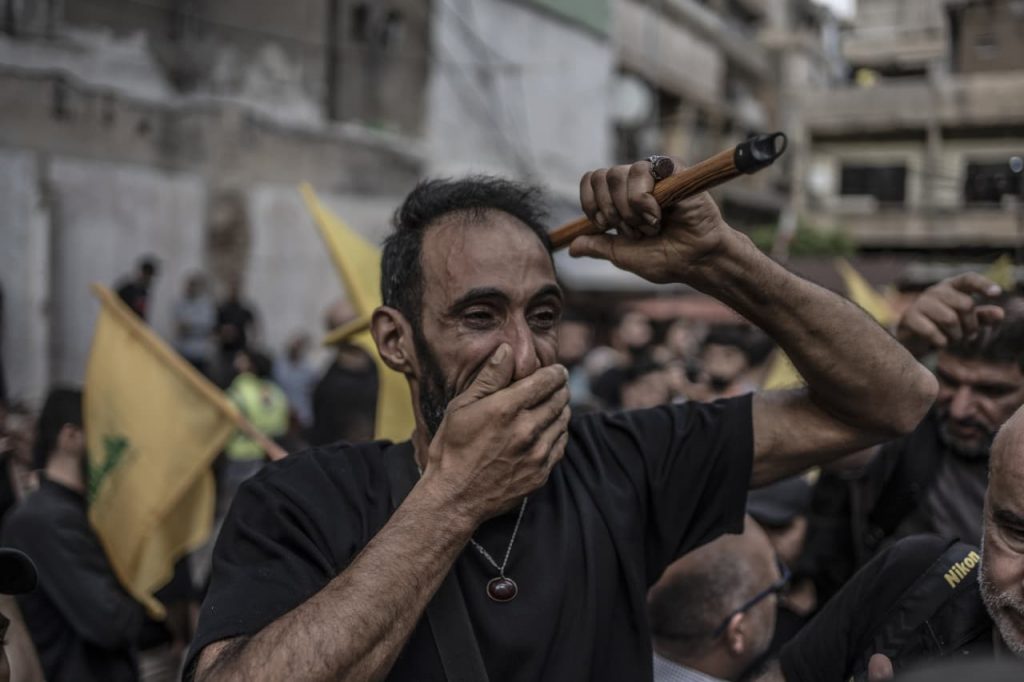
A funeral procession in Beirut for a Hezbollah member killed in a pager explosion. Photo: Manu Brabo for WSJ
Hezbollah members securing a funeral on Wednesday for those killed in the previous day’s blasts could be seen carrying walkie-talkies at the start of the ceremony. After blasts hit the crowd of mourners, the security detail had ditched those devices.
This week’s series of attacks comes as Hezbollah deliberates how to handle the continuing cycle of violence playing out across the Israeli-Lebanese border, which continued in recent days with the group firing antitank missiles into Israel and Israeli warplanes striking in southern Lebanon. It now has to consider whether and how to respond to the extensive attacks on its home turf.
“I’m not going to talk about time or place or type of operation,” Nasrallah said Thursday. “But of course, the punishment will come.”
Hezbollah began firing across the border shortly after the Hamas-led Oct. 7 attacks on southern Israel that left 1,200 dead and sparked the war in the Gaza Strip. Nasrallah reiterated Thursday that the group will continue the barrage until the fighting in Gaza ends.
The near-daily exchanges of fire have largely contained the conflict within unspoken rules of engagement in an effort by both sides to avoid a full-scale war. The rising intensity of violence has U.S. officials and others concerned that the risk of an all-out conflict is rising.
Gerges said this week’s attacks wouldn’t alter the broader strategic calculations between Hezbollah and Israel.
“Anyone who knows Hezbollah quite a bit from the inside out will tell you that these attacks will harden Hezbollah’s stance and will make Hezbollah more determined to resist and continue on its path,” he said.
Write to Stephen Kalin at stephen.kalin@wsj.com , Summer Said at summer.said@wsj.com and Anat Peled at anat.peled@wsj.com
